Redditor Gets Called Out For Not Considering Sister’s Dog Family
Pets hold a special place in the hearts of many people. For some, their pets are more than just animals; they are cherished members of the family.
However, not everyone views pets in this way, and disagreements can arise when it comes to including them in important family events, such as family photos. OP is getting family photos taken this upcoming weekend.
He has three children and a wife and is inviting his parents and sister to participate. The photos are for OP's side of the family, and he plans to do some for his wife's side later.
However, a problem has arisen as OP's sister wants to include her dog in the family photos. OP has declined this request, as he does not consider the dog to be part of his family and does not want to pay for photos with the dog included.
OP's sister considers her dog to be a member of the family, which is fine, but OP feels that he is not obligated to agree. OP suggested that his sister could contribute to the cost of the photos if she wants the dog included, as OP is paying by the hour and is only getting a limited number of edited photos.
However, his sister declined this offer and stated that she would not be willing to pay. She has even hinted that she may not participate in the photo shoot if the dog is not included, stating that it "is not a family photo to her."
Despite this, OP's mother has attempted to persuade OP to include the dog in the photos, and his father is indifferent. Given this situation, OP is wondering if he is the "asshole" for refusing to include the dog in the family photos.
OP asks:

OP is getting family photos taken this upcoming weekend. He has three children and a wife and is inviting his parents and sister to participate.
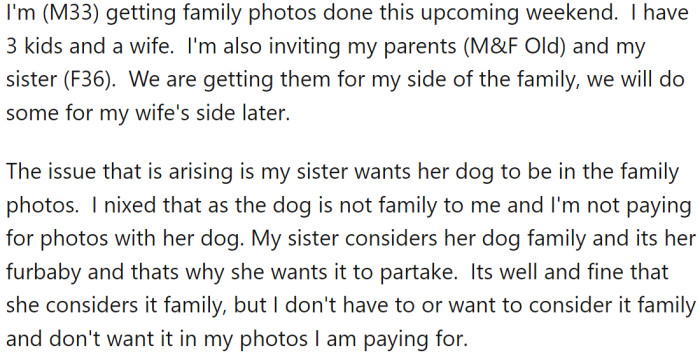
However, a problem has arisen as OP's sister wants to include her dog in the family photos. OP has declined this request, as he does not consider the dog to be part of his family and does not want to pay for photos with the dog included.
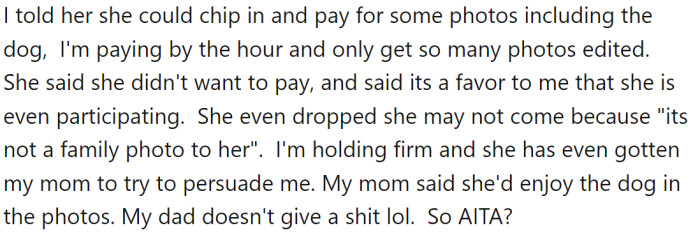
The Role of Family Dynamics in Pet Inclusion
The inclusion of pets in family dynamics can evoke strong feelings and opinions, reflecting deeper relational patterns. Dr. Nancy Wright, a family psychologist at the University of Toronto, explains that pets often symbolize family unity and affection, making their exclusion from family activities particularly sensitive. Research suggests that when family members feel disconnected from each other, they may express this through their relationships with pets.
According to a study published in the Journal of Family Psychology, families that include pets often report higher levels of emotional satisfaction and cohesion.
Understanding Family Dynamics and Pets
The inclusion of pets in family dynamics can evoke a wide range of emotional responses and conflicts. Research in the Journal of Family Psychology indicates that family members often develop strong attachments to animals, which can lead to conflicts when opinions diverge regarding their roles within the family.
In this case, the sister's desire to include her dog in family photos may reflect a deep emotional bond, illustrating how pets can be viewed as integral members of the family unit.
The Role of Pets in Family Dynamics
Research from the American Psychological Association indicates that pets can enhance familial bonds and emotional well-being.
Involving pets in family activities, like photos, reinforces their role as family members, which can be particularly important for those who seek companionship and emotional support.
This concept aligns with attachment theory, which posits that relationships, even with animals, can significantly impact our emotional health.
OP has offered the following explanation for why they think they might be the a-hole:

Plain and simple:

Wise words

This situation highlights the potential for conflict when family members have differing views on the role of pets. For example, some may see pets as integral to family life, while others may view them as secondary. Dr. Karen Miller, a clinical psychologist at UCLA, emphasizes the importance of recognizing these differing perspectives to facilitate open dialogues about family dynamics and pet inclusion.
Research indicates that effective communication around differing views can strengthen family bonds and reduce tensions.
Moreover, the concept of attachment theory can help explain the sister's insistence on including her dog. According to psychological research, individuals often form strong emotional attachments to pets that mirror familial bonds, leading to a desire for recognition and inclusion.
This highlights the importance of understanding these emotional dynamics when negotiating family interactions involving pets.
From a behavioral standpoint, such conflicts often stem from differing perceptions of family roles.
Studies show that these perceptions can lead to disputes when one family member feels excluded, while another does not understand the emotional significance.
Understanding the underlying motivations—such as a desire for inclusion or validation—can help mediate these discussions.
She had options

She shouldn't enforce this on his wallet

OP offered a viable alternative

Navigating Conflicts Related to Pets in Family Settings
When conflicts arise about including pets in family activities, open communication is essential. Dr. Robert Smith, a family therapist at Harvard Medical School, suggests implementing family meetings where members can express their views and feelings regarding pets. Such discussions can foster understanding and empathy, allowing for compromises that respect everyone's feelings.
Research shows that family meetings can enhance cohesion and satisfaction by fostering a sense of belonging among all members.
Navigating Conflicts Involving Pets
Addressing conflicts around pets requires effective communication strategies. Research suggests that utilizing 'I' statements can help individuals express their feelings without placing blame. For example, saying, 'I feel uncomfortable with the idea of including the dog in family photos because...' can pave the way for constructive dialogue.
Additionally, actively listening to the other person's perspective can foster understanding and promote empathy, which are crucial for resolving conflicts.
Communication and Conflict Resolution
Effective communication is essential in resolving family disputes. Research from the Journal of Family Psychology emphasizes the importance of expressing feelings constructively.
When discussing sensitive topics, using 'I' statements can reduce defensiveness and foster a more open dialogue.
This approach can be particularly helpful in navigating disagreements about family dynamics involving pets.
This Redditor understands how sister might be feeling

"If she wants to pay the photographer to take additional photos that include the dog, then that’s her prerogative."
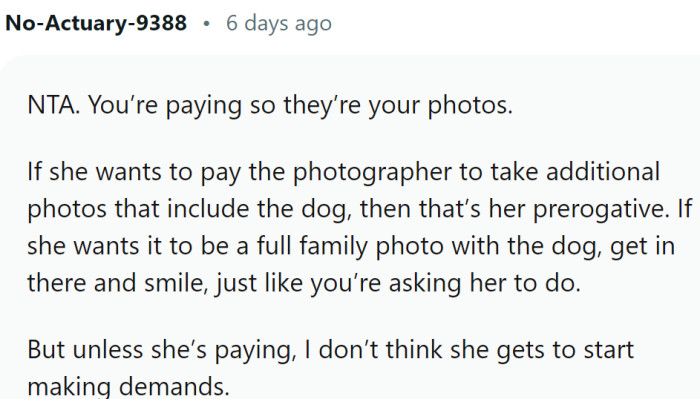
Here, here
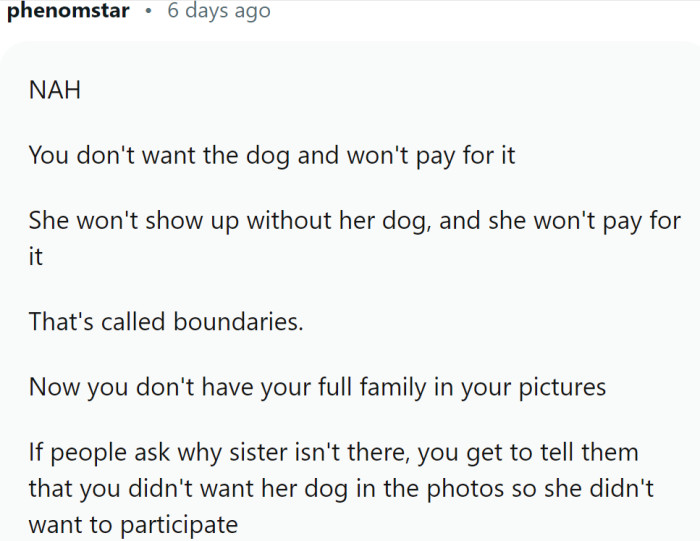
To reduce tensions regarding pets in family settings, families should prioritize regular discussions about their feelings and preferences. Establishing clear agreements about the role of pets can create a more harmonious environment where everyone feels respected. Additionally, engaging in joint activities that include pets can promote bonding while ensuring that all family members feel valued.
Ultimately, fostering open communication and mutual respect is key to navigating the complexities of family dynamics involving pets, promoting healthier relationships.
Strategies for Compromise and Understanding
To navigate conflicts involving pets, it's essential to explore compromises. For instance, suggesting separate family photos that include both the dog and the family members can help honor the sister's attachment while respecting the other family members' preferences.
Research indicates that when individuals collaborate to find solutions that respect both parties' needs, they are more likely to achieve satisfying outcomes that strengthen relationships.
Practicing empathy is crucial in these situations. A study by the University of Michigan found that empathic responses can lead to increased relationship satisfaction.
Taking the time to understand each person's perspective can shift the focus from conflict to collaboration, ultimately benefiting the family unit.
Encouraging family discussions about the roles pets play in their lives could serve as a fruitful exercise in empathy and understanding.
Everyone made their choice

The sister might not feel as a part of the family
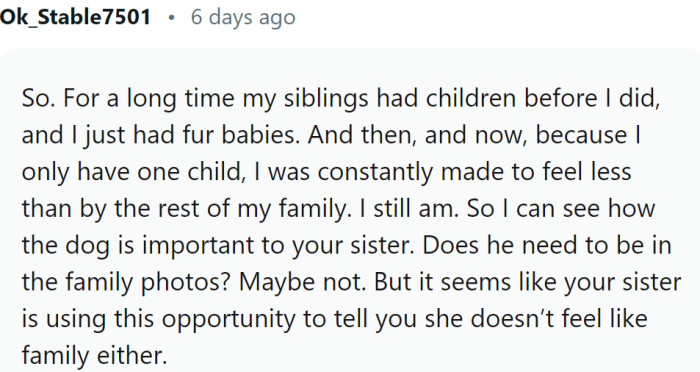
This could be the reason:

The situation faced by OP highlights the challenges that can arise when people have differing opinions about the role of pets in their lives. While some view pets as cherished members of the family, others do not, and this can cause tension and disagreement.
In this case, OP is unwilling to include his sister's dog in the family photos he is getting done, while his sister considers the dog to be a family member and is upset by this decision. Ultimately, it's important for people to have open and honest discussions about their views on pets and to be respectful of each other's opinions.
While it may not always be possible to come to a resolution that everyone is happy with, by making an effort to understand each other's perspectives, we can avoid conflicts and maintain positive relationships.
Psychological Analysis
This situation highlights a common issue where family members may not fully appreciate each other's emotional attachments to pets.
Understanding that pets can play a critical role in emotional support can help bridge the gap in perceptions and lead to more inclusive family practices.
Analysis generated by AI
Analysis & Alternative Approaches
Research consistently shows that family dynamics involving pets are complex and deeply tied to emotional health. As Dr. John Gottman, a renowned marriage researcher, states, "Understanding the emotional needs of all family members, including pets, can significantly enhance family relationships." Embracing everyone's perspective, including that of our furry companions, can lead to healthier family interactions and stronger bonds.
Psychological Analysis
This scenario illustrates how pets can become focal points of emotional attachment within families. Understanding these dynamics is essential for navigating conflicts effectively.
Encouraging open communication about feelings and preferences can help families reach agreements that respect everyone's needs.
Analysis generated by AI
Analysis & Alternative Approaches
In conclusion, navigating family dynamics involving pets requires careful consideration of emotional attachments and preferences. Research shows that effective communication and compromise can significantly enhance relationship satisfaction.
By prioritizing open dialogues and mutual respect, families can foster healthier interactions that honor everyone's feelings.
Psychological Analysis
This scenario illustrates the complexities of including pets in family life. Open discussions about feelings and expectations surrounding pets can foster healthier relationships and greater emotional satisfaction within families.
Analysis generated by AI
Analysis & Alternative Approaches
Understanding the dynamics of family relationships involving pets is crucial for fostering emotional satisfaction and cohesion. By prioritizing open communication and mutual respect, families can navigate conflicts surrounding pets more effectively.
Engaging in discussions about the role of pets can strengthen family bonds and promote a sense of belonging among all members.



